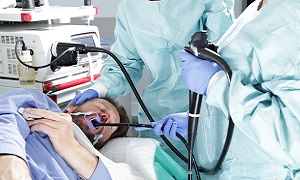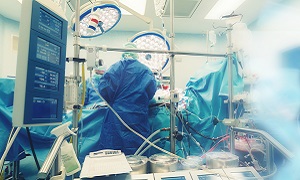Stomach Cancer
Stomach Cancer is the growth of cancerous cells within the lining of your stomach. There is a possibility that these calls might grow into a tumor. Also known as gastric cancer, this type of cancer grows slowly over several years, and is difficult to diagnose, as patients don’t show symptoms in the early stages.
Sometimes, it even goes undiagnosed until it spreads to other parts of the body, making it more difficult to treat.
Symptoms
There are generally various signs and symptoms of stomach cancer, and some of them include:
- Feeling bloated after a meal
- Difficulty swallowing
- Feeling full after eating small amounts of food
- Nausea
- Stomach pain
- Heartburn
- Vomiting
- Indigestion
- Unintentional weight loss
Causes & risk factors
Modern science is still researching what exactly makes cancer cells grow in the stomach. Few things are known to increase your risk for the disease. One of them is infection with bacteria which causes ulcers. Inflammation in your gut, which is known as gastritis can also increase the risk. Pernicious anemia, which is a type of long-lasting anemia, and certain growths in your stomach known as polyps are also known to make you more likely to get cancer.
Few other factors that might increase the risk of stomach cancer include:
- Smoking
- A diet high in smoked, pickled, or salty foods
- Being obese or overweight or obese
- Type- A blood
- Working in coal, timber, metal, or rubber industries
- Epstein-Barr virus infection
- Stomach surgery for an ulcer
- Exposure to asbestos
- Certain types of genes
Stages of Stomach Cancer:
Stage 1: Cancer is present in the inner lining of the stomach.
Stage 2: Cancer has spread into the deeper layers of stomach & nearby lymph nodes.
Stage 3: Cancer has spread to all the layers in the stomach as well as to the nearby organs like spleen or colon.
Stage 4: Cancer has spread far and wide to organs like the liver, lungs, or brain.
Diagnosis
There are several tests and procedures which are used in order to diagnose stomach cancer.
Upper endoscopy
Biopsy
Imaging tests
Your doctor will need to determine the stage of your stomach cancer before he/she can decide which treatment option is best for you. Tests and procedures which are used to determine the stage of cancer include:
Blood tests
Imaging tests
Imaging tests generally include positron emission tomography (PET) and CT scans.
Exploratory surgery
Your doctor may also need to perform surgery to check if cancer has spread beyond your stomach, within your chest, or your abdomen. Exploratory surgery is usually done laparoscopically. This means the surgeon will be making several small incisions in your abdomen and next insert a special camera that transmits images to a monitor in the operating room.
Depending on your situation, other staging tests might be used as well.
The information from these procedures might be used by your doctor to assign a stage to your cancer, which ranges from 0 to IV. The lowest stage indicates that the cancer is quite small and has affected only the stomach’s inner layers. However, by stage IV, the cancer is considered to be quite advanced and may have spread to other areas of the body.
Treatment
Surgery
The goal of surgery is removing all of cancer, as well as some of the healthy tissue around it.
Operations that are used for treating stomach cancer can include:
Removing early-stage tumors from the lining of the stomach
Subtotal gastrectomy
Total gastrectomy
Total gastrectomy involves the removal of the entire stomach as well as some surrounding tissue. After this, the esophagus is connected directly to your small intestine so that food is able to move through your digestive system. Total gastrectomy is generally meant for stomach cancers affecting the body of the stomach as well as those located in the gastroesophageal junction.
Removing lymph nodes to look for cancer
Surgery to relieve signs and symptoms
Radiation Treatment

Radiation treatment is a form of cancer treatment, that uses high-powered beams of energy, such as protons and X-rays to kill cancer cells. In this method, you lie on a table, over which a machine moves around you, sending the energy beams.
Sometimes, radiation treatment might be used before surgery as well, in order to shrink cancer, so that it can be removed more easily.
Radiation treatment is also used after surgery to kill any cancer cells that might be remaining. It is also often combined with chemo.
Chemo
Chemo is a drug treatment that makes use of chemicals to kill cancer cells. The drugs travel throughout the body and kill the cancer cells that might have spread through the stomach.
This treatment might be given before surgery as well, to help shrink cancer so that it might be removed more easily. Chemo is also used after surgery to kill any cancer cells that might be remaining in the body. Sometimes it might also be combined with radiation treatment.
In people with advanced stomach cancer, it might also be used in combination with targeted drug treatment.
Targeted Drug Treatment
Immuno Treatment
Immuno treatment is another form of drug treatment that is meant to help the immune system to fight cancer. Your body’s disease-fighting immune system may not attack cancer on its own as the cancer cells produce proteins. This can make it difficult for your immune system to identify the cancer cells as dangerous. Immuno treatment is generally used when the cancer is advanced, or if it comes back or spreads to any other body parts.
Supportive or palliative care
Palliative care is specialized medical care that puts focus on providing relief from pain as well as other symptoms of a serious ailment. In this method, palliative care specialists work with you and your family as well as your other doctors in order to provide extra support which can complement your ongoing care. You can undergo palliative care while you are undergoing aggressive treatments, like chemo or surgery. Palliative care is provided by a team of doctors, nurses, and trained professionals.













